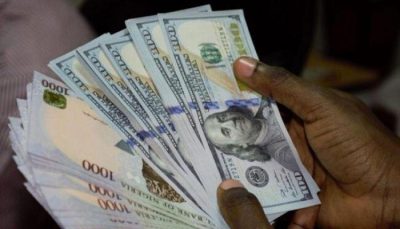Banks lower rates on FX deposits as supply rises
Banks are beginning to reduce their interest rates on foreign exchange (FX) deposits as dollar supply improves.
Olusegun Alebiosu, chief executive officer of First Bank of Nigeria, revealed during an executive roundtable hosted by PwC and BusinessDay on Thursday, noting that the Central Bank of Nigeria (CBN) returned some FX swaps to some banks in January 2025.
“This move signals that banks now have sufficient FX to return to customers, contributing to a drop in foreign deposit currency rates,” he said.
A senior bank official in another Tier-1 bank confirmed this, noting that FX supplies have improved across banks, easing pressure on the economy.
BTA, PTA sales resume
BusinessDay earlier reported that some banks have resumed selling Personal Travel Allowance (PTA) and Business Travel Allowance (BTA) to their customers, signaling foreign exchange availability after previous challenges tied to supply shortages.
The development comes as financial institutions adjust to evolving market conditions and apex bank policy changes.
Ayokunle Olubunmi, head of financial institution ratings at Agusto Consulting, offered insight into the dynamics of the foreign exchange market. He explained that when the gap between official and parallel market rates was small, there was little incentive for customers to approach banks for PTA. There were instances when the official market rate exceeded the parallel market rate, prompting individuals to favour the latter, he said.
However, Olubunmi noted that the widening margin between these rates has now driven more Nigerians to seek PTA and BTA directly from banks.
The shift aligns with policy adjustments implemented by the CBN over the past year to stabilise the foreign exchange market.
Early in 2024, the CBN had directed International Money Transfer Operators (IMTOs) to quote exchange rates for Naira payouts based on prevailing market prices, reflecting a move toward market-determined rates.
In February 2024, the CBN removed restrictions on the spread for interbank foreign exchange transactions and lifted limits on the sales of interbank proceeds. It also mandated that PTA and BTA payouts be made exclusively through electronic channels, a measure analysts at Afrinvest Securities Limited believed would mitigate foreign exchange round-tripping in this segment.
In other to streamline this process, the apex bank said it had approved the release of the Nigerian Foreign Exchange (FX) Code and will officially launch the same on January 28, 2025.
The FX code serves as a guideline to the banking industry to promote the ethical conduct of authorised dealers in the Nigerian Foreign Exchange Market (NFEM).
“The bank will formally launch the Code at the CBN Head Office Auditorium, Abuja, on Tuesday, January 28, 2025,” the CBN said in a notice published on its website.
According to Taiwo Oyedele, chairman of Nigeria’s Fiscal Policy and Tax Reforms during the PwC event, the new FX code introduced by the CBN would enhance transparency and “about $20 million every day is off the market.”
Oyedele argued that the proposed tax reforms, if effected this year, would also give the exchange rate a soft landing, easing its pressures and enhancing fiscal sustainability.
“Some of the reforms we are doing from the fiscal standpoint will take about $4 billion pressure off the market as well,” the tax chief said.
Naira responds
According to data from the apex bank, the naira began the year at an official exchange rate of N1,538.50 per dollar on January 2, 2025. By the end of the first trading week, it had slightly depreciated to N1,544.50 per dollar, reflecting a marginal decline of 0.4 percent
On January 22, the naira closed at N1,553 per dollar compared to N1,551.9 at the Nigerian Foreign Exchange Market (NFEM).
Uche Uwaleke, director of the Institute of Capital Market Studies at Nasarawa State University, forecasts a positive trajectory for the naira, attributing this outlook to lower petrol and food importation as well as increased fuel exports this year.
Uwaleke pointed to the reduced importation of petroleum products as a major driver of the naira rebound.
“With increased domestic refining capacity, we expect a significant decline in fuel imports, which will ease pressure on foreign exchange demand and strengthen the naira,” he explained.
He further highlighted the potential impact of increased earnings from the export of petroleum products.
“As Nigeria boosts its export capacity, foreign exchange inflows will improve, supporting the local currency,” Uwaleke noted.
Another factor, according to him, is the reduction in food imports, stemming from improved agricultural output.
Uwaleke also emphasised the role of foreign portfolio investments and diaspora remittances in supporting the naira, noting that, “Increased foreign investments and remittances from Nigerians abroad will inject much-needed liquidity into the economy.”
He stressed the importance of strong external reserves, noting that maintaining robust external reserves is vital for shielding the economy from external shocks and enhancing investor confidence.
(BusinessDay)


